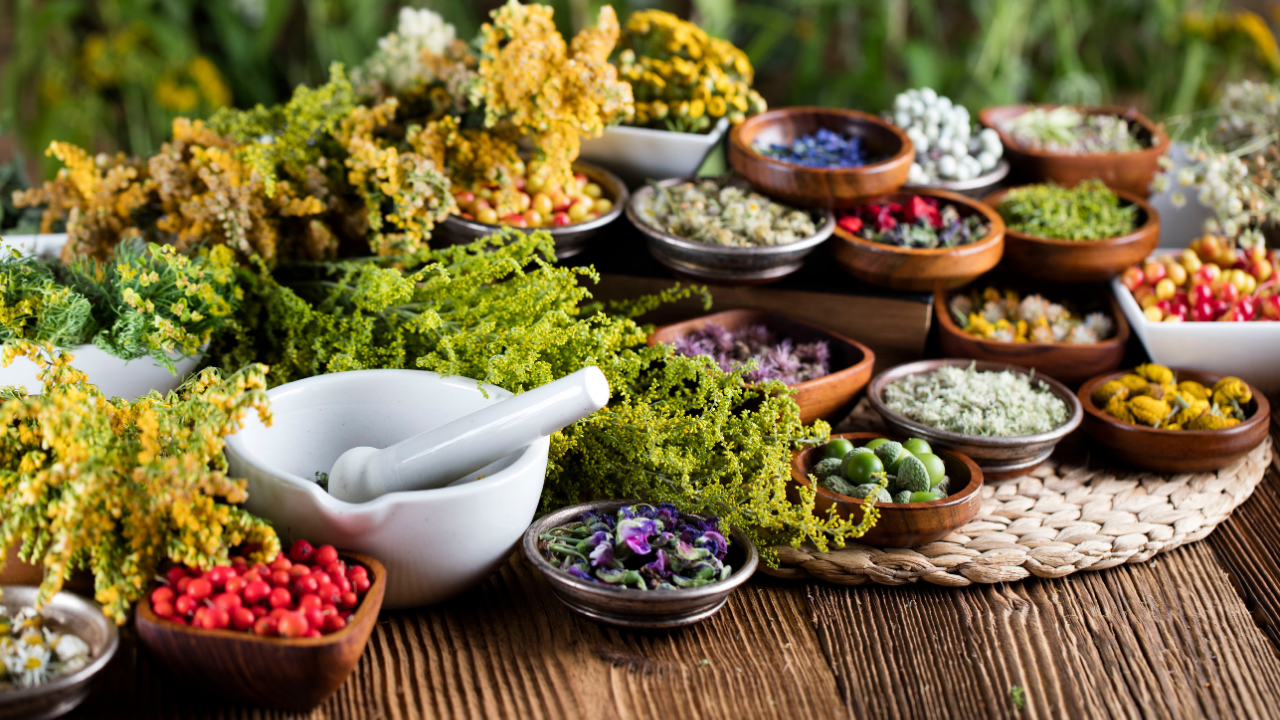Discover the Power of Herbalism: A Journey into Natural Healing

Herbalism stands as a timeless tradition offering amazing healing benefits. Whether you’re looking to incorporate herbs into your daily life, enhance your knowledge of plant medicine, or pursue a professional path in herbal therapy, understanding the foundations of herbalism is essential. This ancient practice, rooted in centuries of tradition, continues to gain popularity as people seek holistic and sustainable approaches to health and well-being.
But What is Herbalism?
Herbalism, also known as phytotherapy or botanical medicine, is the study and practice of using plants for medicinal purposes. This practice has been a cornerstone of healing traditions across cultures for thousands of years, from Traditional Chinese Medicine (TCM), Ayurveda, Native American to Western and Eastern European herbalism. Herbal remedies come in various forms, including teas, tinctures, salves, capsules, and essential oils, each offering unique benefits for the body, mind, and spirit.
The beauty of herbalism lies in its simplicity and accessibility. Many medicinal plants can be easily grown in your backyard, foraged in local forests, or even found in your kitchen pantry, making herbalism a sustainable, cost-effective, and deeply personal way to support your health. Herbalism embraces a gentle, complementary approach to wellness, aligning seamlessly with the body’s natural rhythms. Just imagine sipping a soothing cup of chamomile tea to ease stress or using echinacea tinctures to strengthen your immune system – this practice invites you to reconnect with nature while nurturing your well-being in a way that feels both empowering and intuitive.
easily grown in your backyard, foraged in local forests, or even found in your kitchen pantry, making herbalism a sustainable, cost-effective, and deeply personal way to support your health. Herbalism embraces a gentle, complementary approach to wellness, aligning seamlessly with the body’s natural rhythms. Just imagine sipping a soothing cup of chamomile tea to ease stress or using echinacea tinctures to strengthen your immune system – this practice invites you to reconnect with nature while nurturing your well-being in a way that feels both empowering and intuitive.
Why Learn Herbalism?
The resurgence of interest in herbalism reflects a growing appreciation for the wisdom of traditional healing practices. Here are some compelling reasons to explore herbalism:
- Herbs can address a wide range of health concerns, from improving digestion and reducing stress to boosting immunity and promoting restful sleep. By learning about herbalism, you can take a proactive approach to your health using remedies that align with your body’s natural rhythms.
- Herbalism fosters a deep connection to the natural world. As you learn to identify and work with medicinal plants, you’ll develop a greater appreciation for the earth’s bounty and the complex relationships between humans and plants.
- For wellness practitioners, herbalism is a valuable addition to your toolkit. No matter if you’re an aromatherapist, nutritionist, massage therapist, or yoga instructor, incorporating herbal knowledge into your practice can provide a more holistic approach to healing.
- Herbalism is not just about personal health—it’s about community. By sharing your knowledge, you can empower others to take charge of their well-being and explore natural ways to support their health.
A Holistic Approach of Herbalism and Energetic Herbalism
One of the most fascinating aspects of herbalism is its holistic nature. Unlike approaches that focus solely on symptoms, herbalism seeks to address the root cause of imbalances in the body. This is where energetic herbalism comes into play.
 Energetic herbalism is a nuanced approach that considers the energetic properties of plants and how they interact with the body’s subtle energy systems. This method takes into account factors like temperature (hot, cold, warm, cool), moisture (dry, damp), and tissue states (tense, relaxed, atrophied, congested). By understanding these energetics, herbalists can create personalized protocols that address not only physical symptoms but also emotional and spiritual imbalances.
Energetic herbalism is a nuanced approach that considers the energetic properties of plants and how they interact with the body’s subtle energy systems. This method takes into account factors like temperature (hot, cold, warm, cool), moisture (dry, damp), and tissue states (tense, relaxed, atrophied, congested). By understanding these energetics, herbalists can create personalized protocols that address not only physical symptoms but also emotional and spiritual imbalances.
For example, a person experiencing chronic stress and anxiety might benefit from cooling, calming herbs like lemon balm or passionflower, while someone with sluggish digestion might benefit from warming or stimulating herbs like ginger or peppermint. Energetic herbalism allows practitioners to tailor their recommendations to the individual, ensuring a more effective and harmonious healing process.
Integrating Herbalism into Your Wellness Practice
If you’re a wellness professional, integrating herbalism into your practice can be life-changing. For aromatherapists, combining essential oils with herbal remedies can enhance therapeutic outcomes. For example, pairing lavender essential oil with a chamomile tea can create a powerful synergy for relaxation and stress relief.
Similarly, nutritionists can use herbalism to complement dietary recommendations. Herbs like turmeric and ginger can support digestion and reduce inflammation, while adaptogenic herbs like ashwagandha and holy basil can help the body adapt to stress.
A Solid Foundation Is Key to Herbal Mastery!
If you’re new to herbalism, having a structured and well-rounded education is crucial. The Foundation of Herbalism course by Essence of Thyme College of Holistic Studies is an excellent starting point for anyone interested in exploring the world of energetic herbalism.
This comprehensive course provides the knowledge and skills you need to use herbs, including essential oil-bearing plants, safely and effectively, whether for personal use or professional practice.

What You’ll Learn in the Foundation of Herbalism Course?
- Herbal Preparations – Learn how to craft a variety of herbal remedies, including teas, tinctures, and salves. These preparations allow you to harness the healing power of plants in ways that are convenient and effective.
- Botanical Knowledge – Gain a deep understanding of key medicinal herbs, their properties, and their uses.
- Holistic Health Applications – Explore how herbs including essential oil-bearing plants, can support the body’s natural healing processes, from boosting immunity to promoting relaxation and improving digestion.
- Safe and Ethical Herbal Practices – Learn how to use herbs responsibly, ensuring their sustainability and minimizing the risk of adverse effects.
- Energetic Herbalism – Discover how to work with the energetic properties of herbs to create personalized remedies that address the root cause of imbalances.
- Hands-on-activities - Collect, dry, and mount two herbs alongside an Aromatic Culinary Herb Container Garden Project to grow and utilize culinary herbs.
Who is This Course For?
Herbalism is for everyone, and so is our course! We welcome students from all backgrounds, from those taking their first steps in herbalism to those expanding their existing knowledge. With years of experience guiding learners from diverse careers and skill levels, we ensure that everyone feels supported and empowered to embrace the wisdom of plant medicine.
The Foundation of Herbalism course by Essence of Thyme College is perfect for beginners and enthusiasts eager to explore herbal medicine in a structured and engaging way. It’s also an excellent choice for aromatherapists, wellness professionals, and nutritionists looking to deepen their expertise and seamlessly integrate herbal knowledge into their practice.
Meet Your Instructor: Kat Maier
 The Foundation of Herbalism course is taught by Kat Maier, a renowned herbalist and educator with decades of experience in the field of herbal medicine. Kat is the founder of Sacred Plant Traditions, a centre for herbal studies, and has trained countless students in the art and science of herbalism. Her teachings blend traditional wisdom with modern scientific understanding, providing a well-rounded and accessible approach to plant medicine.
The Foundation of Herbalism course is taught by Kat Maier, a renowned herbalist and educator with decades of experience in the field of herbal medicine. Kat is the founder of Sacred Plant Traditions, a centre for herbal studies, and has trained countless students in the art and science of herbalism. Her teachings blend traditional wisdom with modern scientific understanding, providing a well-rounded and accessible approach to plant medicine.
Kat’s passion for herbalism is contagious, and her ability to simplify complex concepts makes her an ideal instructor for both beginners and intermediates in herbalism. Her guidance will empower you to approach herbalism with confidence and respect for the plants, helping you build a strong foundation and a deeper connection to natural healing.
Start Your Herbal Journey Today!
Taking the first step into herbalism opens up a world of natural healing and empowerment. By learning to work with plants, you can support your health, connect with nature, and even transform your career. The Foundation of Herbalism course provides everything you need to begin your journey with confidence.
Herbalism is more than just a trend—it’s a testament to the enduring wisdom of traditional healing practices. By reconnecting with the natural world and learning to work with plants, we can create a healthier, more balanced way of living. Herbalism empowers us to take control of our health in a way that is gentle, sustainable, and deeply connected to the earth.
So, what are you waiting for? Dive into the world of herbalism and discover the healing power of plants. Your journey to natural wellness starts here!
Article by: Essence of Thyme College of Holistic Studies
About Essence of Thyme College of Holistic Studies
Essence of Thyme College of Holistic Studies offers 300- and 630-hour professional aromatherapy certification programs that help you grow a successful, fulfilling career by specializing and creating your market niche. Professional Level Certification prepares graduates to become aromatherapy consultants, launch product lines or retail businesses, or provide services as an adjunct to existing holistic health specializations. Master Level Certification and electives are ideal for certified aromatherapists seeking higher education or a path to clinical aromatherapy practice.
All Essence of Thyme programs focus on aromatherapy product development and advanced formulation, evidence-based research, spa and business management, international industry regulatory guidelines, and sustainability and conservation of essential oil and carrier oil-bearing plants.
Our comprehensive, evidence-based programs meet or exceed the criteria set forth by 5 international professional aromatherapy associations. Learn more about our aromatherapy certification programs.


